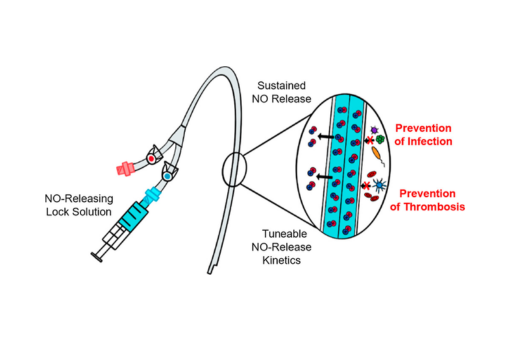Nitric Oxide-Releasing Hemodialysis Catheter Lock Solutions
Abstract
In an attempt to address the significant morbidity, mortality, and economic cost associated with tunneled dialysis catheter (TDC) dysfunction, we report the development of nitric oxide (NO)-releasing dialysis catheter lock solutions. Catheter lock solutions with a range of NO payloads and release kinetics were prepared using low-molecular-weight N-diazeniumdiolate nitric oxide donors. Nitric oxide released through the catheter surface as a dissolved gas was maintained at therapeutically relevant levels for at least 72 h, supporting clinical translatability (interdialytic period). Slow, sustained NO release from the catheter surface prevented bacterial adhesion in vitro by 88.9 and 99.7% for Pseudomonas aeruginosa and Staphylococcus epidermidis, respectively, outperforming a burst NO-release profile. Furthermore, bacteria adhered to the catheter surface in vitro prior to lock solution use was reduced by 98.7 and 99.2% for P. aeruginosa and S. epidermidis, respectively, when using a slow releasing NO donor, demonstrating both preventative and treatment potential. The adhesion of proteins to the catheter surface, a process often preceding biofilm formation and thrombosis, was also lessened by 60–65% by sustained NO release. In vitro cytotoxicity of catheter extract solutions to mammalian cells was minimal, supporting the non-toxic nature of the NO-releasing lock solutions. The use of the NO-releasing lock solution in an in vivo TDC porcine model demonstrated decreased infection and thrombosis, enhanced catheter functionality, and improved outcome (i.e., likelihood of survival) as a result of catheter use.
Citation
Nitric Oxide-Releasing Hemodialysis Catheter Lock Solutions
Sara E. Maloney, Quincy E. Grayton, Christine Wai, Unimunkh Uriyanghai, Jasleen Sidhu, Prabir Roy-Chaudhury, and Mark H. Schoenfisch
ACS Applied Materials & Interfaces 2023 15 (24), 28907-28921
DOI: 10.1021/acsami.3c02506


